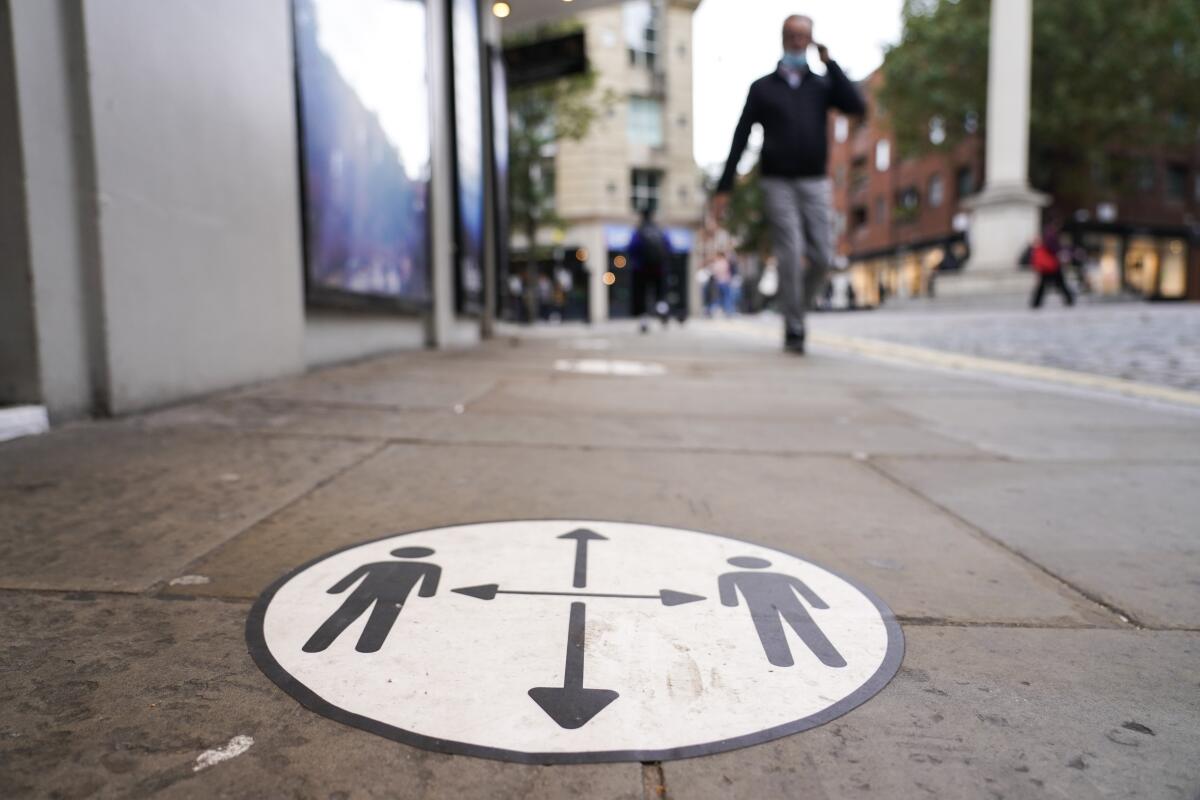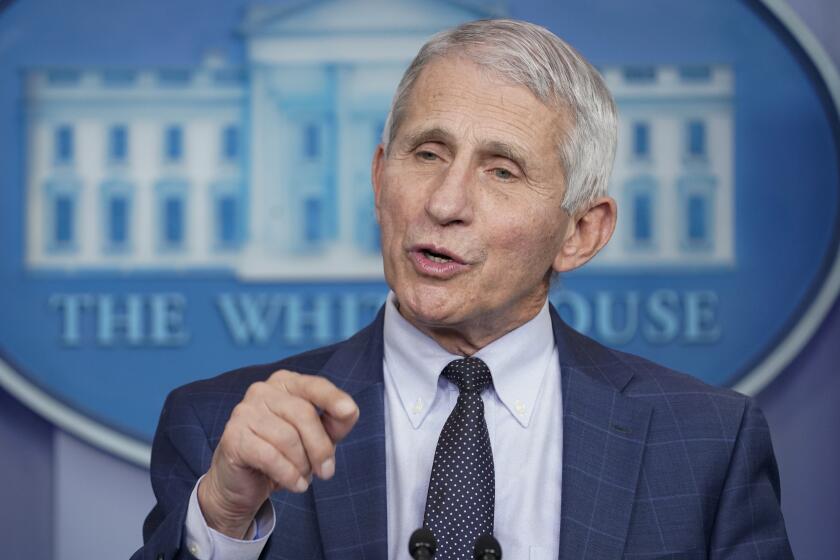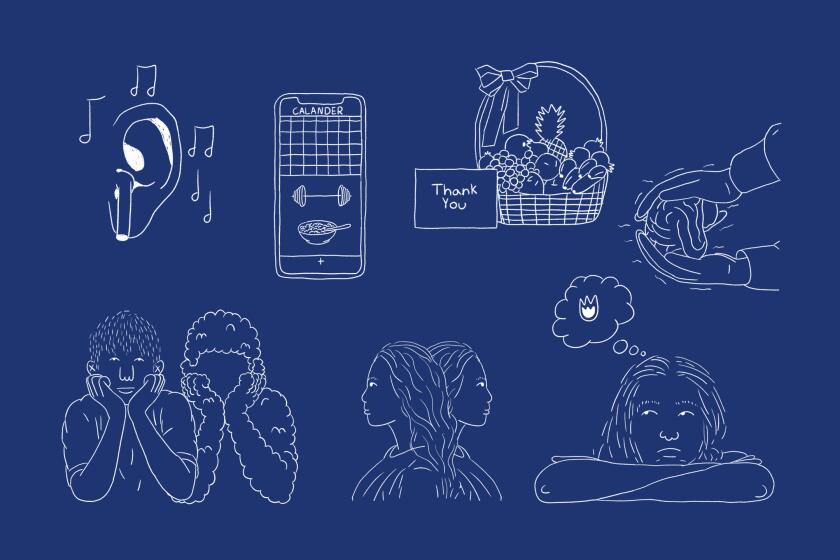Op-Ed: Your brain doesn’t like uncertainty — and that will help you cope with COVID

- Share via
The availability of COVID-19 vaccines earlier this year allowed for the partial reboot of life as usual during the pandemic. But the Omicron variant — and its Delta predecessor — have come along to remind us that COVID-19, like your Uncle Ted at the holidays, is here to stay for an undetermined while longer.
Now that we definitely know a finish line to this health crisis is not within sight, how can we mentally adjust to this latest new normal? Psychological research conducted in my lab at Duke University and elsewhere has illuminated how times of uncertainty affect anxiety and alter our perception of time and provided insights into how we can help ourselves cope.
With more knowledge about how COVID-19 works and affects society, we will move from the higher state of uncertainty we are in to a moderate steady-state of uncertainty. But there’s a catch: The brain doesn’t like uncertainty. Ambiguity makes us uncomfortable.
U.S. health officials say early indications suggest the Omicron variant may be less dangerous than Delta, which continues to drive a surge of hospitalizations.
Each wave of infection brings renewed uncertainty. During moments of respite from increased case counts and hospitalizations, we experience relief and savor the temporary termination of our unease. This is why we are likely to prefer Mozart over Schoenberg, or upbeat screenplays by Nora Ephron over the bleaker offerings of Lars von Trier — our nerve pathways are tuned to expect harmonious resolutions.
The brain pulls every trick it has to try to make sense of the unknown and fill us with an aura of well-being. With every twist in the story of the pandemic, we experience surprise. Surprise focuses our attention on new information to update our predictions about how things are likely to play out in the future. Turning points in the pandemic’s timeline create narrative junctures that, like book chapters, organize our memories of it. Consequently, we gain a sense of control over our fears and expectations and are able to keep track of long-lasting events.
The pandemic feels much different now than in 2020, which brimmed with dread and the unknown. Back then, a general malaise set in, accompanied by social isolation and distress. Time tended to stand still in lockdown as so many of us felt trapped in an infinite Zoom loop.
But now we know more about how to treat and manage COVID-19. This wisdom reduces our uncertainty and allows the brain to expend less effort seeking to understand the problem. As we adjust, we’ll need fewer distractions from daily life such as doomscrolling tweets about COVID-19 infections in Uzbekistan or fact-checking dubious home remedies from sketchy news sources.
An interesting byproduct of uncertainty reduction is that it alleviates anxiety and speeds time perception. Just as a baseball batter might see the last pitch of a strikeout in slow motion, time slows down or seems to stand still under duress. To jump-start the brain’s internal clock, surges of dopamine are needed, and they come from moments of novelty and enjoyment (and are suppressed in reaction to cortisol, a hormone secreted during stress).
You can help yourself relax amid the pandemic. Start by shedding negative thoughts
The influence of emotion on our biological clock means that your perception of time speeds up when you’re having fun or during less anxious times. For instance, many of my college students said this semester’s in-person classes had flown by compared with the dreariness of last year’s socially isolated remote learning.
Although we don’t necessarily know what the future of COVID-19 will bring, we will probably have mini-waves of infection due to new mutation spread or yearly seasonal variations that are accompanied by periods of subjective time expansion and compression as their associated stress waxes and wanes.
However, people are not equally tolerant of uncertainty, even at moderate levels. How can the less tolerant learn to manage the ongoing health crisis? Like the superhero Elastigirl, who can contort her body into any size or shape to meet the physical challenges she faces, psychological flexibility is key to tempering mental health symptoms related to COVID-19.
To be psychologically flexible, you must become less resistant to the emotions and behaviors that will naturally vary in response to the demands of a dynamic health crisis. That means being accepting of the frustrating periods when COVID-19 upswings disrupt our routines along with the periods of calm when things feel more normal. Becoming more mindful of our emotions in the present moment will prevent us from feeling overwhelmed by the enormity of COVID-19’s global impact over the long haul.
Problem-solving coping strategies also can reduce COVID-19 anxiety for those who tend to be easily stressed out by the uncertainty of the pandemic. For some, these strategies may include seeking out safe social interactions to reduce feelings of loneliness. Others may need to change the way they think about COVID-19 to focus less on its threatening aspects. For example, they could consider how life changes due to the pandemic, such as having a new hybrid working schedule, might be personally beneficial.
Linking problem-solving to the present needs identified by mindful awareness will ensure optimal adaptation to whatever COVID-19 throws our way.
Kevin S. LaBar is the associate chair of the Department of Psychology & Neuroscience at Duke University.
More to Read
A cure for the common opinion
Get thought-provoking perspectives with our weekly newsletter.
You may occasionally receive promotional content from the Los Angeles Times.












